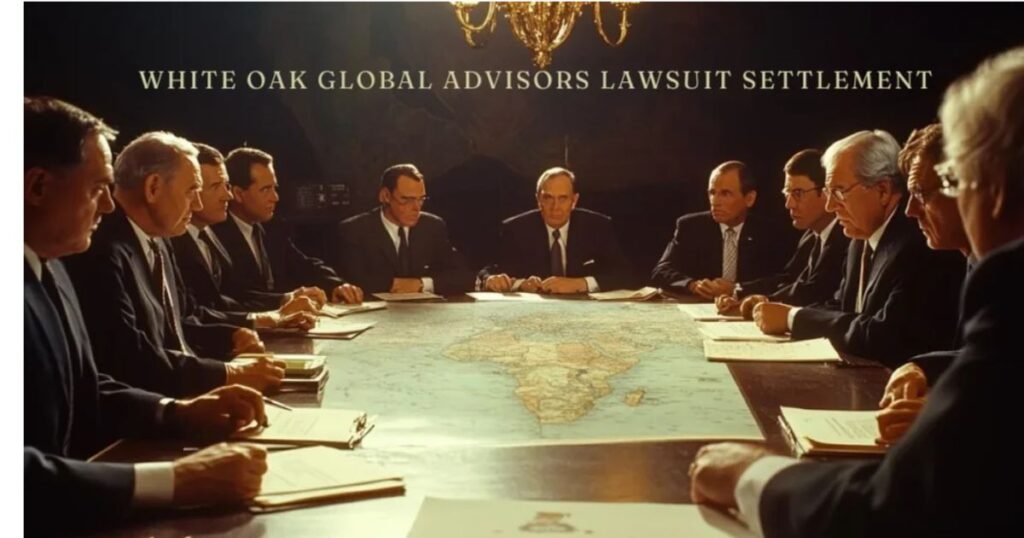The White Oak Global Advisors lawsuit settlement, exceeding $100 million, resolves claims of pension fund mismanagement. The case involves allegations that White Oak violated the Employee Retirement Income Security Act (ERISA), which mandates that investment firms act in their clients’ best interests, especially with retirement funds.
In 2018, the New York State Nurses Association Pension Plan (NYSNA) sued White Oak, accusing the firm of mishandling funds and lacking transparency. This lawsuit highlights the importance of ethical conduct and clear communication in managing retirement assets.
The settlement not only addresses the financial losses but also emphasizes the need for strict adherence to fiduciary duties. It serves as a crucial reminder for investment firms to uphold high standards and protect retirement savings.
The Lawsuit
In 2018, the New York State Nurses Association Pension Plan (NYSNA) sued White Oak Global Advisors. They claimed White Oak mismanaged the pension funds, causing big financial losses.
The lawsuit focused on serious issues like lack of transparency and failure to act in the best interest of the fund’s beneficiaries. The case was significant, involving a settlement of over $100 million, highlighting the need for ethical handling of retirement savings.
Mismanagement of Plan Assets: The lawsuit said that White Oak Global Advisors mishandled the pension fund’s assets. They allegedly used risky investment strategies that put the money at risk. This mismanagement led to major financial losses, hurting the retirement security of many nurses.
Undisclosed Negotiations: The NYSNA Pension Plan also accused White Oak of hiding important negotiations. They claimed the firm was involved in secret talks about a top executive role. This lack of openness raised worries about conflicts of interest and suggested that White Oak might not have acted in the best interest of the pension fund.
Breach of Fiduciary Duty: The main issue was a breach of fiduciary duty. The lawsuit argued that White Oak failed to act in the best interest of the pension plan’s beneficiaries. This means they did not follow the legal and ethical standards required for managing retirement funds properly.
Read This Article: Did AT&T Really Bathing Suit Full Body AT&T Lily Fired
Arbitration and the Court’s Decision

After the lawsuit was filed, the case went to arbitration. This is a process where an independent arbitrator reviews the evidence and makes a decision. In this case, the arbitrator found that White Oak Global Advisors had indeed mismanaged the pension funds and failed to be transparent.
The arbitrator ruled that White Oak needed to pay back over $96 million to the NYSNA Pension Plan. This amount covered the losses caused by the mismanagement of the plan’s assets. The firm was also ordered to give up all the investment fees they earned during the period of misconduct.
The NYSNA Pension Plan then asked a federal court to confirm the arbitration decision. In 2022, the court agreed with the arbitrator’s ruling. The judge’s decision reinforced the penalty and affirmed that White Oak had acted improperly.
This court ruling was important because it gave legal weight to the arbitration decision. It showed that there are serious consequences for failing to manage pension funds correctly and failing to follow ethical guidelines.
A Federal Judge Upholds the Arbitration Award
In 2022, a federal judge confirmed the arbitration decision in the White Oak Global Advisors case. Judge Lewis A. Kaplan agreed with the earlier ruling, which ordered White Oak to pay over $96 million for mishandling the pension funds. This decision made the settlement official and reinforced the consequences for the firm.
The judge’s ruling highlighted the seriousness of White Oak’s actions and supported the NYSNA Pension Plan’s claims. By upholding the arbitration award, the court showed that investment firms must follow strict rules and act transparently when managing retirement funds.
The Importance of Fiduciary Duty in Investment Management
Fiduciary duty is crucial in managing investments. This means that investment advisors must always act in the best interest of their clients, especially when handling retirement funds. This duty ensures that advisors make careful, honest decisions and put their clients’ needs first.
Prudent Investment Practices: Prudent investment practices involve making smart and careful choices with clients’ money. Advisors should research and analyze investment options thoroughly to avoid unnecessary risks. They need to manage the funds wisely to protect and grow the investments for the benefit of the clients.
Loyalty and Good Faith: Loyalty and good faith mean advisors must act with integrity and prioritize their clients’ interests over their own. They should avoid any actions that could lead to personal gain at the expense of their clients. This helps build trust and ensures that clients’ needs are always the primary focus.
Full Disclosure: Full disclosure requires that advisors be open and honest about all aspects of their investment decisions. This includes clearly explaining fees, risks, and any potential conflicts of interest. Transparency helps clients make informed choices and ensures there are no surprises about their investments.
Read This Article: Miami Heat vs 76ers Match Player Stats
The Impact of the White Oak Lawsuit on the Financial Industry

The White Oak lawsuit has had a big effect on the financial industry. It showed how important it is for investment firms to follow ethical practices and be transparent. The case highlighted that failing to do so can lead to severe consequences and financial penalties.
Investment firms are now more aware of the need to manage funds responsibly. They understand that any mismanagement or lack of transparency can lead to legal trouble and damage their reputation. The lawsuit has made firms more cautious about how they handle investments.
Regulators are also taking notice. The case has prompted them to consider stricter rules and better oversight for investment firms. This is to ensure that such issues do not happen again and that investors are better protected in the future.
Protecting Pension Funds and Beneficiary Interests
Keeping pension funds safe is crucial for ensuring that retirees have the money they need. It involves careful management and making sure all actions benefit the people whose money is being managed. The recent lawsuit shows how important it is to be vigilant and responsible when handling retirement savings.
To protect pension funds, pension plan administrators must be proactive. They need to check regularly on how their funds are managed and ensure everything is done transparently. This way, they can prevent issues before they become serious problems.
- Importance of Due Diligence: Due diligence means carefully checking and choosing investment advisors. Pension plan administrators should review the advisor’s history and performance before hiring them. This helps ensure they are trustworthy and will manage the funds properly.
- Active Oversight: Active oversight involves regularly monitoring how investment advisors are managing the funds. Pension plan administrators should keep a close eye on the investments and make sure they follow the agreed-upon strategies. This helps catch any problems early and ensures the funds are being handled correctly.
- Regular Communication: Regular communication is key to keeping everyone informed. Pension plan administrators should maintain open lines of communication with both the investment advisors and the beneficiaries. This helps build trust and ensures that everyone knows what is happening with the pension funds.
Steps for Holding Investment Firms Accountable

Ensuring investment firms are held accountable is vital for protecting investors and their assets. If an investment firm fails to meet its responsibilities, there are several steps investors can take to address the issue and seek resolution.
Reviewing Investment Performance: Start by carefully reviewing the performance of your investments. Check if the returns are as expected and if the investments align with the agreed-upon strategies. Significant deviations or poor performance could be a sign of mismanagement or misconduct, prompting further investigation.
Scrutinizing Fees: Examine the fees charged by the investment firm. Make sure they are reasonable and clearly explained. Unexplained or unusually high fees can be a red flag for potential issues and should be questioned to ensure that you are not being overcharged.
Seeking Clarification: If you have concerns about your investments or fees, don’t hesitate to ask your investment advisor for clarification. Request detailed explanations about their decisions and fee structures. Clear answers can help address any doubts and ensure transparency in how your funds are managed.
Filing Complaints: If your concerns are not resolved through direct communication, you can file a complaint with relevant regulatory bodies. For example, you can approach the Securities and Exchange Commission (SEC) or the Pension Benefit Guaranty Corporation (PBGC) for assistance. They can investigate potential violations and take appropriate actions.
Consulting an Attorney: In cases of serious misconduct or unresolved issues, consulting with an attorney specializing in securities law can be beneficial. An attorney can offer legal advice, help you understand your options, and represent you in any legal actions against the investment firm.
The Role of Regulators in Ensuring Ethical Investment Practices
Regulators play a crucial role in maintaining ethical standards within the investment industry. Their responsibilities include enforcing laws, monitoring compliance, and protecting investors from misconduct. By ensuring that investment firms adhere to legal and ethical guidelines, regulators help foster a fair and transparent financial environment.
Regulators conduct investigations into potential violations and impose penalties on firms that breach rules. They also set standards for investment practices and guides to ensure that firms act in the best interests of their clients. Their oversight helps prevent unethical behavior and maintains trust in the financial system.
Key Roles of Regulators:
- Proactive Investigations: Regulators should actively seek out and investigate potential violations of investment laws and regulations rather than waiting for complaints from investors.
- Imposing Sanctions: They have the authority to impose penalties, such as fines or suspensions, on firms that engage in unethical practices. These sanctions serve as a deterrent against misconduct.
- Enforcing Compliance: Regulators enforce adherence to investment laws and ethical standards. They ensure that firms comply with regulations designed to protect investors and maintain market integrity.
- Fostering Collaboration: Collaboration and information sharing among regulatory bodies can enhance oversight and enforcement. Working together helps address complex issues and improves overall regulatory effectiveness.
- Educating Investors: Regulators often provide resources and education to help investors understand their rights and the standards they should expect from investment firms. This empowers investors to make informed decisions and hold firms accountable.
How Did White Oak Global Advisors Respond to the Lawsuit?
Throughout the legal proceedings, White Oak Global Advisors maintained a stance of denial regarding the allegations. The firm argued that their investment practices were sound and that any issues raised were either misinterpreted or not reflective of their actual conduct. They chose to settle the lawsuit, possibly to avoid prolonged litigation and further reputational damage.
Contested the Allegations: White Oak Global Advisors contested the accusations of mismanagement and breach of fiduciary duty. They argued that their investment strategies were appropriate and that they had acted within industry standards. This stance was aimed at disputing the claims made by the NYSNA Pension Plan and defending their practices.
Highlighted Their Track Record: The firm pointed to their historical performance and reputation to counter the lawsuit’s claims. They emphasized their track record of managing investments responsibly in an effort to demonstrate their commitment to ethical practices and to argue that the allegations were not indicative of their overall operations.
Expressed Disagreement with the Settlement: Although White Oak Global Advisors settled the case, they expressed disagreement with the settlement terms. They likely viewed the settlement as a compromise to avoid further legal costs and damage to their reputation despite their ongoing denial of the allegations.
Reactions to the White Oak Case

The White Oak Global Advisors lawsuit has sparked various reactions within the investment community. Experts and industry participants have shared their views on the implications of the case and its impact on the industry.
Investment Law Specialists: Investment law specialists view the White Oak case as a significant example of holding investment advisors accountable. They see it as a precedent for enforcing fiduciary duties and ensuring that investment firms adhere to legal and ethical standards. This case highlights the importance of rigorous legal oversight in protecting investors.
Financial Regulators: Financial regulators see the case as a reminder of the need for stronger oversight and stricter regulations. The case underscores the need for regulators to ensure that investment firms follow ethical practices and maintain transparency. It may prompt regulatory bodies to review and tighten existing rules to prevent similar issues in the future.
Investment Advisors: For ethical investment advisors, the White Oak case reinforces the importance of maintaining high standards of fiduciary duty. It serves as a reminder of the consequences of failing to act in the best interests of clients and highlights the need for transparency and accountability in all investment practices.
The Future of ERISA Enforcement
The future of ERISA (Employee Retirement Income Security Act) enforcement is likely to involve significant changes and improvements. As the landscape of retirement planning and investment management evolves, regulators and policymakers are considering ways to strengthen protections for plan beneficiaries.
Strengthening Fiduciary Duty Standards: Future ERISA enforcement will focus on enhancing fiduciary duty standards. This involves tightening rules for investment advisors to ensure they always act in their client’s best interests. Stronger standards will help prevent misconduct and protect retirement funds.
Increasing Resources for Regulatory Bodies: Regulatory bodies, like the SEC, may need more resources to enforce ERISA effectively. Additional funding and staffing can improve their ability to investigate violations and hold investment firms accountable.
Enhancing Whistleblower Protections: Improving whistleblower protection is crucial for future ERISA enforcement. Better legal safeguards encourage reporting of misconduct and help uncover issues that might otherwise go unnoticed.
Promoting Greater Transparency: Future efforts will likely emphasize increasing transparency in the investment industry. This could mean requiring detailed disclosures about investment practices, fees, and conflicts of interest, helping investors make better decisions.
Encouraging Industry Best Practices: There will be a push to promote best practices within the investment industry. Fostering ethical behavior and responsible management will create a more secure and trustworthy environment for retirement funds.
Potential Consequences for White Oak Global Advisors Beyond the Settlement
The settlement with the NYSNA Pension Plan has significant implications for White Oak Global Advisors. Beyond the financial penalties, the firm may face several long-term consequences.
Reputational Damage: The settlement could tarnish White Oak Global Advisors’ reputation. A damaged reputation might affect their ability to attract new clients and maintain current ones. Trust is crucial in the investment industry, and a scandal can have lasting effects.
Regulatory Scrutiny: White Oak Global Advisors might encounter increased scrutiny from regulatory bodies like the SEC. This could lead to more frequent audits and investigations, putting the firm under a microscope and potentially leading to further legal or regulatory actions.
Difficulty Retaining Existing Clients: Existing clients may lose confidence in the firm’s management practices. As a result, some clients might seek other investment firms, leading to a potential loss of business and impacting the firm’s financial stability.
Increased Compliance Costs: To prevent future issues and restore trust, White Oak Global Advisors may need to invest in stronger compliance measures. This could involve implementing new policies, enhancing internal controls, and increasing staff training, all of which can lead to higher operational costs.
Legal and Financial Impact: Ongoing legal and financial repercussions may arise from the settlement. The firm might face additional lawsuits or claims from other parties affected by their actions, compounding the financial and legal challenges they already face.
Safeguarding Retirement Security
Selecting a trustworthy investment advisor is crucial. Pension plan administrators must carefully research advisors, reviewing their track records and investment strategies to ensure they align with the plan’s goals.
Regular Oversight: Ongoing monitoring of investments is essential. Administrators need to regularly check the performance of funds and ensure that advisors follow the agreed-upon strategies to catch any issues early.
Maintaining Transparency: Open communication is key. Administrators should provide regular updates to beneficiaries about fund management. Transparency helps build trust and keeps everyone informed about the status of their retirement assets.
Addressing Issues: When problems arise, administrators should have a plan to address them. This may involve discussing concerns with advisors or seeking assistance from regulatory bodies to protect the funds.
Proactive Problem-Solving: Being proactive is important for safeguarding retirement security. Administrators should act quickly to resolve issues, whether by improving oversight, enhancing communication, or involving legal experts.
Read This Article: Did AT&T Really Bathing Suit Full Body AT&T Lily Fired
Trust and Transparency in the Investment Landscape

Trust is key in investments. Investors need to be confident that their money is managed ethically. Investment firms build trust by upholding high standards and acting in their client’s best interests.
- Ensuring Transparency: Transparency means clear communication about investment practices. Firms should share details on how funds are managed, including fees and strategies. This helps investors make informed choices.
- Regular Updates: Frequent updates are important. Firms should regularly inform clients about their investments and any changes. This keeps investors aware and engaged.
- Addressing Concerns: Promptly addressing concerns is essential. Firms should provide clear answers and quick resolutions to any questions or issues clients have. This reinforces trust and confidence.
- Promoting Ethical Practices: Ethical practices build trust. Firms should follow strong ethical guidelines and avoid conflicts of interest. Prioritizing ethics strengthens relationships and reputations.
Conclusion
The White Oak Global Advisors lawsuit settlement, involving over $100 million, has significant implications. It highlights the consequences of mismanaging pension funds and failing to act transparently. This case is a stark reminder of the need for investment firms to adhere strictly to fiduciary duties.
The settlement brings closure to a serious dispute, reinforcing the importance of ethical investment practices. It underscores the need for investment firms to manage retirement funds responsibly and maintain clear communication with clients.
Moving forward, this case serves as a warning to other firms. It shows that failure to manage investments properly can lead to severe financial and legal repercussions. Firms must prioritize trust, transparency, and ethical conduct to protect their clients and ensure financial stability.
FAQs
What was the main issue in the White Oak Global Advisors lawsuit?
The lawsuit focused on allegations of mismanagement of pension funds and lack of transparency by White Oak Global Advisors. It highlighted serious concerns about their handling of retirement assets.
How much did White Oak Global Advisors settle for?
White Oak Global Advisors settled for over $100 million. This amount was intended to cover the financial losses incurred by the New York State Nurses Association Pension Plan.
What does the settlement emphasize for investment firms?
The settlement emphasizes the need for strict adherence to fiduciary duties and ethical conduct. It serves as a reminder for investment firms to manage funds transparently and responsibly.
What steps can be taken to safeguard retirement security?
To safeguard retirement security, it’s essential to select trustworthy advisors, maintain regular oversight, and ensure transparency in fund management. Addressing issues proactively helps protect retirement assets.










